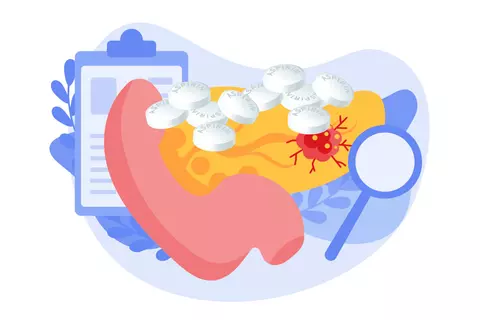Aspirin and pancreatic cancer risk in diabetes
Tan JT et al, Gut. 2025;74(4):603-612
In a very large retrospective cohort study of patients with diabetes from Hong Kong, treatment with aspirin was associated with a lower risk of pancreatic cancer and lower pancreatic cancer-associated mortality.
Background: Patients with type 2 diabetes mellitus (T2DM) have higher pancreatic cancer (PC) risk. While aspirin has chemopreventive effects on digestive cancers, its effect on PC among patients with T2DM is unclear.
Methods: This retrospective cohort study identified newly diagnosed adult patients with T2DM in Hong Kong between 2001 and 2015 from a territory-wide healthcare registry. Exclusion criteria were history of PC, pancreatic cyst, IgG4 disease, or pancreatectomy. To address reverse causality between PC and T2DM, the authors excluded patients with PC diagnosed within 1 year of T2DM. They also excluded patients with less than 1 year of observation. Primary outcome was PC, and secondary outcomes were PC-related and all-cause mortality. Aspirin use was treated as time-varying variable (≥ 180 day-use/year) to address immortal-time bias, and multivariable Cox regression model was employed to derive adjusted hazard ratio (aHR). Propensity-score (PS) matching was used as secondary analysis.

Results: Among 343,966 newly diagnosed patients with T2DM (median follow-up: 10.5 years; interquartile range, 7.7–14.5 years), 1224 (0.36%) developed PC. There were 51,151 (14.9%) deaths from any cause, and 787 (0.2%) died from PC. Aspirin use was associated with lower PC risk in both time-dependent (aHR = 0.58; 95% confidence interval [CI]: 0.49–0.69) and PS matching analysis (aHR = 0.61; 95% CI 0.48–0.77). An inverse relationship was observed with increasing dose and duration of aspirin use (ptrend < 0.001). Aspirin was also associated with a lower risk of PC-related mortality (aHR = 0.43; 95% CI: 0.34–0.53) and all-cause mortality (aHR = 0.78; 95% CI: 0.76–0.80).
Conclusions: Aspirin use may be an oncopreventive strategy to reduce PC risk in patients with T2DM. Further studies are warranted to validate the study findings.